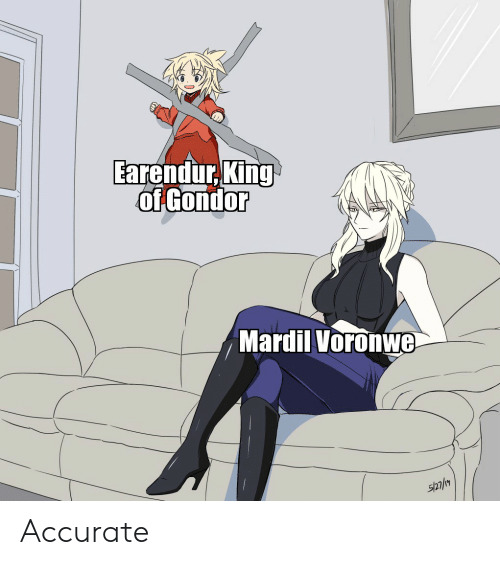#mardil voronwë
Text
On the one hand, I absolutely love the high tragedy of Denethor's arc in the book, think it's amazingly well-written, and that he is one of the most complex and fascinating characters that Tolkien ever wrote.
On the other, there's part of me that's also a little frustrated by how much it has to happen because Tolkien kind of wrote himself into a corner with the Ruling Stewards. He's insistent on a few things about them:
Their initial rise to power as perma-regents of Gondor was squeaky-clean. Mardil was a paragon of virtue, he tried to prevent Eärnur from getting himself killed, there were no clear successors, and retaining the regency prevented another Kinstrife and created a stable institution that would hold Gondor together for 900+ years after the failure of the kings.
They are a high Númenórean family descended from Elendil, even if they're not formally of the line of Elendil (for unknown reasons, but most likely because they're descended through women).
Denethor is notably very similar to Aragorn, in intellect, wisdom, stature, ability, even appearance. He is a towering and respected figure, and he and his sons are highly popular with their people (even with children).
Denethor's military tactics in the book are very good, and UT says Sauron hoped Denethor would be less prepared than he actually was.
Denethor is proud, unbending, and personally dislikes and distrusts Aragorn. He thinks Gandalf is using him against Sauron for now while planning for Aragorn to take power later (this is filtered through his pride but ... um, is he wrong?).
Faramir, now Denethor's last heir, is a fantastic if reluctant warrior and captain, a super special Númenórean throwback, and a thoughtful, intelligent, and wise person who is humbler than Denethor, but also established as wary about Aragorn.
Gondor formally rejected the claim of Aragorn's family before the Ruling Stewardship even existed.
What all this means is that Denethor, if alive, is someone who will never willingly give way to Aragorn. Denethor has legal precedent on his side, he is himself a perfectly good ruler from a long-standing, stable, legitimate ruling family and a highly capable military leader in war, he is liked by his people, and he even has a viable heir regardless of the personal strain between him and Faramir.
There's just no reason for Aragorn to take power that Denethor, as written, would find remotely persuasive. But Denethor is also too noble and capable and special for a power grab on Aragorn's side to feel right, esp given how destructive it would be in the middle of a war (as Aragorn acknowledges!). Despite the sparkly kingliness and mystical airs, this is fundamentally a dynastic dispute between two different houses descended from Elendil, based on the minutia of Gondorian and Númenórean law and precedent, and a fight over that is ... not the kind of story this is.
Denethor has to be driven to self-destruction by the plot so that Aragorn's rise can happen. It simply would not occur if Denethor was alive and in his right mind. Faramir has to be mystically healed by Aragorn so that his reservations will dissolve and he will voluntarily remove himself from the picture in a way that doesn't feel bad.
And both scenes are fantastic, and make sense for the characters. But I do feel that they kind of get steamrollered by the plot to make way for Aragorn.
The thing that makes that doubly fascinating, though, is that Tolkien didn't have to prop the House of the Stewards up so thoroughly. He could have written a version where the Stewards are inadequate or really sketchy or simply can't be compared to Aragorn's greatness and it's clear why they should be replaced by him and his house. Tolkien could have made this a lot easier for himself! And I do respect the more difficult and nuanced approach Tolkien took with the Stewards by making them genuinely impressive and noble and capable in their own right and not just cardboard-cutouts for Aragorn to kick over.
But, well.
#anghraine babbles#long post#legendarium blogging#legendarium fanwank#húrinionath#denethor#faramir#mardil voronwë#etc#ondonórë blogging
307 notes
·
View notes
Text
It's interesting how Malbeth the Seer's role for the later kings of Arthedain parallels the Steward's role for the later Gondorian kings. Both serve as chief advisors, with something of a spiritual, quasi-religious role. Malbeth gives prophectic guidance to the kings, the Stewards keep the tradition of Isildur.
Both seem clearly associated with spiritual power, Malbeth with foresight, the Stewards with the ability to read the hearts and minds of others (going by Denethor and Faramir at least).
But the key difference it seems is that for all their spiritual power, the Húrinionath are pragmatists at heart, and seem to have a flair for the political. Malbeth on the other hand doesn't seem to know or care (telling the king to name his son last king is not a good way to inspire confidence in your dynasty!)
I also find it interesting that the decision for the Dúnedain that Malbeth talks about, is arguably the one taken by Pelendur. Putting Eärnil II on the throne of Gondor. The more hopeful, pragmatic choice, the one a Steward would always take regardless of signs and omens.
I wonder if any of the Húrinionath, probably Vorondil or Mardil met Malbeth after the fall of Arthedain, I can't imagine they got on well...
4 notes
·
View notes
Text
i’m all over the place today (sorry not sorry) [actually mildly sorry] BUT one does not simply control or ignore the hyperfixation.
anyways; i just replayed silent street on an alt and this will never fail to make me insane
Eärnil II says, “Who defies the claim of my son?”
Eärnil II says, “Why does my son flee death?”
Eärnil II says, “What vile force guides my hand?”
Mardil Voronwë says, “Has the King at last returned?”
Mardil Voronwë says, “Your plans are ill-laid.”
Mardil Voronwë says, “What cruel fate is this?”
Mardil Voronwë says, “Eärnur... must fall.”
AND THEN
Boromir I says, "The Morgul-blade bites deep!"
Boromir I says, "You cannot hold forever..."
Boromir I says, "The blade... it is still... within."
Boromir I says, "Feel the fading of your life!"
Boromir I says, "Glory to Gondor!"
Telemnar says, "Plague-bearers! Slay them!"
Telemnar says, "The Plague claims all!"
Telemnar says, "The Plague rots us all!"
Telemnar says, "I feel the Plague within me once more..."
Telemnar says, "Let the Plague take you!"
Tarannon Falastur says, "Berúthiel, do you torment me still?"
Tarannon Falastur says, "The Sea was to be my resting place!"
Tarannon Falastur says, "Choke and sputter!"
Tarannon Falastur says, "The Sea claims all!"
Tarannon Falastur says, "What was it all for?"
Atanatar II says, "Come to mock me like the others?"
Atanatar II says, "Suffer my fate!"
Atanatar II says, "I will not fail my people again!"
Atanatar II says, "Time erodes all."
and you also straight up fight meneldil who’s isildur’s nephew at the end of the fight which is. yk. fun.
#it does very much feel like it's a Gondor Day TM tho so i guess i'll be doing smthn with that#sticky note tag#screaming crying throwing up#for reference bc i can never remember the deal with all of these people at the same time#and have to look at least one of them up#boromir i was the father of cirion; he died bc he was shot with a morgul [arrowhead? blade? idk] and got a really bad wasting disease#telemnar was king of gondor during the plague and the watch on mordor ceased and then 2nd the white tree withered and died#[the 3rd one is the one from that's there during wotr before being replaced by the sapling aragorn found]#atanatar ii kinda just. did nothing and mordor kinda took advantage of that.#and then tarannon. oh boy this guy did so much but he was a ship-king and. did so many things#now having typed that i probably should remember them better#i hope lmao
5 notes
·
View notes
Photo








the line of elros ❖ stewards of gondor ❖ headcanon disclaimer
Hador was the youngest child and only son of Túrin I by his second wife, Meldis. He witnessed his father’s poor treatment of his first family, Andreth of Belfalas and her daughters, and resolved to be a kinder husband and kinsman. After Túrin’s death, Hador reconciled with his estranged sisters and invited them to return to Minas Tirith. The youngest and worst-treated, Níniel, did not come, but her elder sisters Lalaith and Nellas were glad to be welcomed back to the city of their birth and the family they had left behind.
Lalaith was older than Hador’s own mother, and soon became a mentor to Meldis in needlework and philosophy. Nellas was likewise many years Hador’s elder, but the two became fast friends, and she often advised him in political decisions.
Due to Túrin’s age at the time of his birth, Hador inherited young, before his marriage. Like his father, Hador wed the love of his youth, but he was determined to remain a loving husband to his wife. Thus, when that wife confessed to him shortly after the birth of their first and only child that he was a man at heart, Hador fully supported his transition from wife to husband despite the scandal it caused in court. This husband, who named himself Maerion, lived joyfully at Hador’s side, though due to the hostile nature of Gondorian politics he often went on long journeys, mastering the bow and entering athletic competitions in the various fiefs throughout the land.
Hador ruled in a time of peace, and became known not for any great deeds but rather his alteration of the Stewards’ Reckoning first established by his ancestor Mardil Voronwë. On the three hundredth anniversary of the calendar’s implementation, he added an extra day to the year to reduce the millennial deficit and ensure that timekeeping was kept in synchronization with the seasons. He lived to an admirable age of 150 years, but was the last man of Gondor to have such a lifespan; after him, the lifespan of those with Númenórean blood began to wane.
The son of Hador and Maerion was Barahir, named as his father was for a mighty lord of the Edain. As his father’s reign was long and mostly uneventful, Barahir gave little thought to running a nation and focused instead on hunting in the White Mountains. He was frequently absent from home, leading to quarrels between him and his wife Taweneth. Though Taweneth did not leave Minas Tirith, after one such argument she did depart to a different part of the city, taking her daughter Rían with her, though Barahir insisted he keep his son Dior with him in the Stewards’ house.
Barahir grew old sooner than his ancestors, and upon his death at age 122 it began to be speculated that a harsh temperament decreased the lifespan of a Dúnadan. Fearing his own decline, his son Dior decided to spend his rule as Steward doing good deeds. Dior oversaw the renovation of Minas Tirith’s lower districts, providing food and shelter for the poor, and ensured that Gondor’s outer settlements received as much support as the capital did. Alas, this did not prevent him from succumbing to old age at 107, though he was remembered kindly by his people for his efforts. Still, he lived longer than his namesake, whose elven blood did not prevent him from an early death at age 36.
Dior never married, for his desires were turned toward men and the attitude of Gondor was against such unions at the time, especially after his grandfathers Hador and Maerion flouted custom with their “unconventional” marriage. He took various lovers throughout his life, but kept his affections secret to all but his sister Rían, whose son Denethor was named Dior’s heir.
Rían came of age free of her father’s shadow. She became an herbalist in the Houses of Healing and was known for her curiosity about the wider world. Once, on a visit to Ithilien, Rían made the acquaintance of an elf who had once been of the Laegrim, those led by King Denethor who died on Amon Ereb. Rían greatly admired her new friend and was eager to hear the tales of the Laegrim, returning to Minas Tirith to ensure the story was recorded correctly. She even named her son Denethor in the Avarin king’s honor.
The husband of Rían was Bellmund, a farmer who dwelt on the outskirts of the Pelennor Fields who once came to the Houses of Healing for treatment of a deep cut received while reaping his crops. They fell in love and were soon wed; though her mother Taweneth was sad to see her daughter leave, she allowed Rían to move to her husband’s farm, in part to spite Barahir’s disapproval of the union.
When Barahir died and Dior became Steward, Rían frequently took to visiting her brother in the city, accompanied by her son Denethor. When it became apparent that Dior would not marry, she convinced him to name Denethor his heir, and moved her family from Bellmund’s farm to the Steward’s House.
#tolkienedit#oneringnet#lotr#silmarillion#gondor#hador of gondor#oc maerion#barahir of gondor#oc taweneth#dior of gondor#rian of gondor#oc bellmund#denethor i#my edit#my writing#edit writing#headcanons#tefain nin#stewards of gondor#line of elros
42 notes
·
View notes
Text
shhhh bro quiet I'm thinking about holding a copy of Mardil Voronwë's treatises on the role of the ruling stewards
18 notes
·
View notes
Text
one has nothing to do with the other, but I still find it highly amusing that the last Steward to use a Quenya name was . . . Mardil Voronwë
1 note
·
View note
Text
It's time to ask the most pressing LOTR question of them all:
Faramir is excluded to give other Stewards a chance because he was only briefly Ruling Steward.
---
*Best means what it means to you!
**Movie Denethor does not count for the purposes of this poll.
#i am very tired from gardening so this amused me :P#anghraine babbles#poll nonsense#legendarium blogging#lord of the rings#house of húrin#húrinionath#hador son of túrin#mardil voronwë#boromir son of denethor i#cirion#dior son of barahir#denethor son of rían#túrin son of húrin i#denethor#túrin son of thorondir#beregond son of beren#ecthelion son of turgon
129 notes
·
View notes
Text
I searched Mardil Voronwë to try and see how old he was when Gondor's war with Angmar began and this came up:

I'm in absolute stitches right now.
1 note
·
View note
Text
I never remember exactly how long the Stewards ruled Gondor until I go to calculate it, and every time I’m just like ... o_O
Mardil Voronwë, ‘the Good Steward,’ began ruling after King Eärnur rode off to challenge the Witch-king in 2050 of the Third Age.
Aragorn restores the monarchy in 3019 of the Third Age.
By the end of the War of the Ring, the Stewards had ruled Gondor for 969 years.
Even accounting for somewhat longer lifetimes and the delicate political situation in Gondor, that is a hell of a long time for any dynasty to stick around.
#and this specific family has been attached to the stewardship in general since#*checks*#1621#so 1398 years#and the stewards of their tenure were less 'elderly advisor' and more 'prime minister+regent/viceroy'#occasionally people will be like 'why does gandalf make such a big deal about them? they're just stewards' and it's like#!!!!!!!!!#and húrin was considered a high númenórean himself so the family was probably established much earlier#pome says they were 'elf-friends' back in the day so ... yeah#in any case i feel like—okay. tolkien sets things up so that faramir's surrender of the stewardship is inevitable#but i feel like people don't always appreciate what a significant thing it was for faramir to do#and he even offers to end the /entire/ stewardship—which predates his family's accession to it 1400 yrs earlier#aragorn being like 'ahhh let's not do that' is right but it is also smart#which is basically how i see aragorn so!#anghraine babbles#legendarium blogging#húrinionath#ondonórë blogging#mardil voronwë#eärnur#aragorn#faramir
56 notes
·
View notes
Text
It’s obviously not the worst part of that wtf take on the Stewards, but “most notably” Ecthelion? Over Mardil? Boromir? Cirion?
Pffft.
#but ecthelion liked aragorn so that makes him the best steward of them all#>_>#anghraine rants#húrinionath#legendarium blogging#legendarium fanwank#ecthelion ii#mardil voronwë#steward boromir#cirion#tbh cirion is probably the best ruler gondor ever had#ondonórë blogging
9 notes
·
View notes
Text
lesbiansforboromir replied to your post: I was searching for a quote and instead found a...
Ohhhhhhh I’m writing a strongly worded letter, how dare they
right??? they were like, his epithet was probably a self-serving ahistorical slant of the later Stewards and people of his time thought he was an ambitious power-grabber and I’m just NOPE! NO THANKS & BYE
#lesbiansforboromir#respuestas#me: 5'4"#also me: i will FIGHT EVERYONE#/#//#///#////#/////#mardil voronwë#legendarium blogging#legendarium fanwank#i wrote a (very short) au where mardil does become king and it's still not......that#húrinionath
21 notes
·
View notes
Text
I was searching for a quote and instead found a discussion about how Mardil was actually grasping and power-hungry
My opinion:

#and i thought pelendur and denethor bashing was bad#hOW DARE#anghraine babbles#legendarium blogging#legendarium fanwank#mardil voronwë#húrinionath
10 notes
·
View notes
Note
Any thoughts on Mardil Voronwe, Gondor's first Ruling Steward?
I love him!
He seems to have been kind of the ideal personification of the Stewardship itself. It would have been so easy for him to make a power grab—he seems to have had influence over Eärnil, given that he was able to restrain him for some period of time (when he could have just let him go and taken power).
And even when he did take power, it was through the legitimate requirements of the Stewardship—he knew better than to make a divisive claim. I imagine him as steady, principled, thoughtful, and loyal, someone who would always put the interests of Gondor’s people above his or his family’s aggrandizement. Truly Mardil the Faithful! :)
#anon replies#respuestas#mardil voronwë#legendarium blogging#lord of the rings#húrinionath#de las bóvedas#Anonymous
15 notes
·
View notes
Photo








the line of elros ❖ stewards of gondor ❖ headcanon disclaimer
Mardil Voronwë was the son of Vorondil, and became the first Ruling Steward of Gondor. He served as the third and last Steward to Eärnil II and after him his son Eärnur. Upon Eärnur’s inheritance, the Witch-king of Minas Morgul, whom Eärnur had faced in the North, challenged him again to single combat. Eärnur, rash and humiliated by his failure in their first encounter, was eager to answer, but all his counselors clearly saw that it was a trap.
It took the combined persuasion of Eärnur’s mother, lover, and his Steward to convince him not to go at that time, but after his lover was slain in a skirmish, not even the wisdom of Mardil could prevent him from answering the Witch-king’s third challenge. Eärnur left his crown upon the lap of his father in the Houses of the Dead, where it would remain until Steward Faramir would pass it to King Elessar nearly a thousand years later. Eärnur rode past the gates of Minas Morgul with a small escort of loyal knights, never to be seen again.
As his fate was for a time uncertain and Eärnur had named no heir, nor were there any obvious lords of royal descent to step forth and make their claim, no new King was selected. Thus, with a heavy heart, Mardil took up the leadership of Gondor, first of the Ruling Stewards. He began his rule with the promise to lead “until the King returns,” at first with the hope that Eärnur would ride back to Minas Tirith in glory, and later as but a formality.
Mardil ruled Gondor with wisdom and patience during the time known as the Watchful Peace, earning the epithet Voronwë, “the Steadfast.” He was an even-tempered and practical man who paid close attention to even the minutiae of bureaucracy. His wife Anoriel was likewise a fastidious scholar, and it was at her suggestion that Mardil established a Stewards’ Reckoning of time, inserting two leap-days in an effort to maintain a coherent calendar.
The son of Mardil Voronwë and Anoriel was Eradan, first of the Stewards to be named in Sindarin save for those who had taken names from great heroes of the First Age. Eradan was a solitary man who preferred quietude and the company of books. His wife, Gilwen, was of a similar mind, and together they agreed to leave one another alone as soon as their only son Herion came of age.
Unlike his father, Herion was a lively and boisterous man eager to enter the social circles of Gondor. He wed the dancer Cadwareth, a beautiful woman whom he adored despite her own inconstant affections. Their son Belegorn was a hunter like his ancestor Vorondil, and though he never brought down a beast so mighty as the Kine of Araw, he carried the Horn of Gondor with a reverence matched only by his love for his wife Lossendil, a healer-woman of Ithilien he met on his travels.
#tolkienedit#oneringnet#lotr#silmarillion#gondor#mardil voronwe#mardil#oc anoriel#eradan#oc gilwen of gondor#herion#oc cadwareth#belegorn#oc lossendil#my edit#my writing#headcanons#tefain nin#stewards of gondor#line of elros
43 notes
·
View notes
Text
I was tagged by @lantur in the last line meme!
Rules: write the latest line from a WIP and tag as many people as there are words in the line. Make a new post!
The last thing I worked on was the cast list for my fake Dúnedain-centric adaptation of LOTR, so I’m not sure if it counts as a WIP per se. The last line I wrote was:
While she can be arrogant, she is intelligent, strong-willed, and fiercely loyal to her family and to Gondor, and is valued as such by Denethor.
The last WIP fic-as-fic I worked on was the Fíriel (f!Faramir w/o anyone else genderbent) fic:
“The first, Mardil Voronwë, began his rule about nine hundred and sixty years ago.”
Not tagging that many people, but if you have WIPs: @kareenvorbarra, @elwing, @heckofabecca, @squirrelwrangler, @irresistible-revolution, @kazaera, @ncfan-1
#literally the last thing i worked on was the lucy outline for the sequel to tjatsl but the last line would be a total spoiler#meme#meme prattle#fic talk#fíriel of minas tirith#gondor: the series#legendarium blogging
6 notes
·
View notes
Photo





the line of elros ♚ royalty of gondor ♚ headcanon disclaimer
Arcíryas was the younger brother of Narmacil II. While his brother was a physically vigorous man who rode often with the armies, Arcíryas was a sharp-minded politician who aided his father Telumehtar Umbardacil in the governance of Gondor. He disapproved of his brother’s elopement with Alassindo the Warrior, who he saw as an unfit queen-in-the-making and not the war captain he was in truth, and advocated to his father that Narmacil be denounced as heir. After the birth of Narmacil and Alassindo’s son Calimehtar, ensuring the continuation of his line, Telumehtar dismissed his younger son’s arguments, engendering a lasting resentment in Arcíryas and his descendants who felt robbed of the crown.
The wife of Arcíryas was Moicanítë, a soft-spoken court scribe who bent to her husband’s will—in his eyes, a better candidate for the spouse of a king than Alassindo. Nevertheless, Moicanítë had difficulty producing a “proper” heir for her husband, giving him four daughters before at last she bore him a son, Calimmacil.
Though he and his cousin Calimehtar were childhood friends, Calimmacil was twisted by his father’s anger and as an adult became a fierce political opponent of the house of the King. When Narmacil died in battle after a reign of only six years, Arcíryas and Calimmacil attempted to wrest the crown from Calimehtar. But the court’s favor lay still with their fallen king, and just as his father had, they dismissed Arcíryas’ claim in favor of the rightful heir.
Calimmacil was a fierce warrior, competing with Calimehtar in all things, and he was determined to win glory in Calimehtar’s campaign against the Wainriders. Leaving behind his wife Lótëaloxë and his young son Siriondil (named for his kingly ancestor), Calimmacil marched to war and threw himself recklessly into battle. He was killed in the last battle, dying just as victory was secured. Calimehtar honored him despite their rivalry, and offered to take Siriondil into his care, but Lótëaloxë declined his aid. At this time Arcíryas, deeply grieving the loss of his son, retreated from court and ceased to pester the king.
Siriondil was raised without a direct influence from his father or grandfather, and thus was less harsh in his opposition to the kings. Still, he was his father’s son, and his mother passed on Calimmacil’s goals to him, and he inherited this familial rivalry. Siriondil attempted to win the hand of Lúnaduinë, daughter of Calimehtar, thus perhaps putting his heirs in line to the throne, but Lúnaduinë declined his suit in favor of her lover Quildoloro. Instead Siriondil married Vánquassë, daughter of the Lord of Pelargir.
It seemed unlikely that Siriondil would succeed in his ancestral goal of “reclaiming” the crown of Gondor, as Lúnaduinë’s brother King Ondoher had two sons and Lúnaduinë herself had one son, leaving his son Eärnil (also named for a previous king) fourth in line for the throne. Yet when Ondoher and all his other heirs perished in battle against the Wainriders, it was Eärnil, now a great general who had defeated the Haradrim and avenged the king’s death, who had the strongest claim to kingship. Eärnil expected to be declared king easily, but he was met with a challenge in the form of Arvedui of Arthedain.
Arvedui was the husband of Ondoher’s daughter Fíriel, who under the old laws of Númenor would have inherited as Ruling Queen. Arguing that Fíriel was the rightful ruler of Gondor, and that as the Heir of Isildur he was also the Heir of High King Elendil, Arvedui argued that he should become king of Gondor. His children would be heirs of Arnor and Gondor, reuniting the Two Kingdoms and fulfilling the prophecy of the seer Malbeth.
But to the men of Gondor, Arthedain was a small kingdom and only a remnant of Arnor, never as glorious as their own realm. Furthermore, Ondoher’s steward, Pelendur, was a friend of Eärnil and spoke for him among the Council of Gondor, who denied Arvedui’s claim in favor of the victorious Gondorian general, who ascended to the throne as Eärnil II and fulfilled his ancestor’s dream of kingship.
Eärnil was generous to Arvedui and offered to aid Arnor when he was able, and indeed, when the Witch-king of Angmar made to attack Arthedain, he sent his son Eärnur to their defense. But Eärnur arrived too late, for Arthedain had fallen and Arvedui had been lost at sea. Nonetheless, he joined with the forces of Círdan to destroy Angmar. The Witch-king challenged Eärnur to single combat, but when Eärnur answered, his steed swerved and fled in terror, disgracing him much to the Witch-king’s delight.
Angmar’s victory was short-lived, for soon warriors from Rivendell arrived, led by the elf-lord Glorfindel. With these reinforcements, Angmar was routed, and the Witch-king fled before Glorfindel’s might. Eärnur attempted to pursue him, but Glorfindel halted him, warning him that the Witch-king’s doom was far off, and foreseeing he would not fall by the hand of man.
During his time in the north, Eärnur met Morimmacil, a fierce warrior who had survived the ruin of Arthedain, and the two became lovers. Foreboding that the Witch-king would rise again, Morimmacil followed Eärnur back to Gondor, spurred by love and duty both. He was soon proven correct, for the Witch-king besieged Minas Ithil after recovering his strength in Mordor. Eärnil failed to save the city, which fell to the Witch-king and renamed Minas Morgul, the Tower of Sorcery. In response, Eärnil changed the name of Minas Anor to Minas Tirith, the Tower of the Guard.
Upon Eärnil’s death, Eärnur inherited the crown of Gondor. The Witch-king challenged him again to single combat, and remembering his disgrace in the North, Eärnur was eager to answer. It took the combined persuasion of his mother Telpinë, his lover Morimmacil, and his steward Mardil to convince him not to go. Instead he focused on winning tournaments in Gondor and defending Minas Tirith against the Witch-king’s assaults.
In one such skirmish, Morimmacil was slain. Furious and deeply grieved, Eärnur could not be stopped when the Witch-king taunted him with his lover’s severed head and challenged him once more. Eärnur left his crown upon the lap of his father in the Houses of the Dead, where it would remain until Steward Faramir would pass it to King Elessar nearly a thousand years later. Eärnur rode past the gates of Minas Morgul with a small escort of loyal knights, never to be seen again.
As his fate was for a time uncertain and no heirs had been named, no new king was selected. The leadership of Gondor thus passed to the Stewards, beginning with Mardil Voronwë, who began his rule with the promise to lead “until the King returns.”
#tolkienedit#oneringnet#gondor#arciryas#oc moicanite#calimmacil#oc lotealoxe#prince siriondil#oc vanquasse#earnil ii#oc telpine#earnur#oc morimmacil#my edit#my writing#edit writing#headcanons#tefain nin#line of elros#royalty of gondor#long post#transphobia /
24 notes
·
View notes